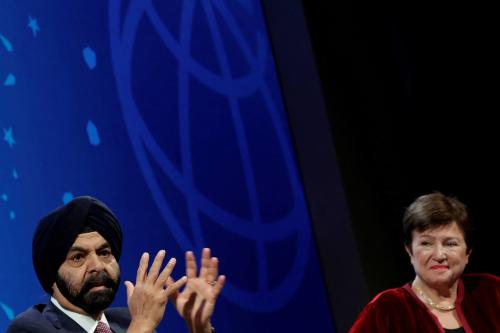Q&A with Peter Kenen
Walker Professor of Economics and International Finance Emeritus, Princeton University
In a time of increasing uncertainty about global financial markets and the future of the international monetary system, Peter Kenen, Walker Professor of Economics and International Finance Emeritus at Princeton University, discussed the most critical global economic issues and the future of the International Monetary Fund with Domenico Lombardi, Brookings Global Nonresident Senior Fellow.
The interview was part of the Global Seminar Series featuring Peter Kenen, who discussed “IMF Reform: A Marathon, Not a Sprint”. Read more.
Q: In your view, what are the most critical issues facing the international financial system right now?
A: Clearly, the most critical issue is restoring stability to the national financial systems and devising ways to deal with the weaknesses revealed by the so-called subprime problem in the United States.
There are difficult issues to resolve within countries and internationally: when and to what extent should central banks ‘rescue’ afflicted institutions and markets, balancing the need to provide liquidity to credit markets that freeze up with the need to minimize moral hazard? Is there need to reform the rating agencies? How to prevent the deep decline in residential construction and sales of existing homes from becoming a full-fledged recession in the United States? What, if anything, can be done to rectify the new misalignment of exchange rates—the undervaluation of the dollar against European currencies and several others and the continued overvaluation of the dollar against the Chinese currency. The high and rising price of oil, as well as foodstuffs and other raw materials also poses a serious problem for which there is no ready solution at hand.
Q: Do you think there is a real chance that the monetary system will move away from the U.S. Dollar in the near future? Would a Euro-Dollar bi-polar currency system make international monetary cooperation easier or more difficult?
A: There is already fragmentary evidence of shift away from the dollar by foreign investors and foreign official institutions and toward a euro-dollar bipolar system, although it has been modest to date. A bipolar system could require closer international cooperation, but it is not clear that such cooperation would be forthcoming.
Q: What is the IMF’s role in this increasingly multi-polar world of international finance? How can it re-gain the effectiveness and legitimacy it once held?
A: The IMF has several roles to play, but the most important, I believe, is the oversight of exchange rates and imbalances of the sort we have seen in recent years. . The IMF has instituted what it describes as multilateral surveillance – bringing together the countries chiefly involved in a major international problem, such as the transpacific imbalance. But the Fund must play a stronger role in the conduct of those consultations. It must bring to the table its own views as to the policy changes required, rather than leave that to the individual countries. That may be the only way in which the Fund can have significant influence over the constellation of national policies. As to the legitimacy of the Fund, it must redistribute voting power to give emerging-market and low-income countries and larger role and stake in the work of the Fund. The Fund is moving in this direction, but slowly and to an insufficient extent.
Q: The G7 cannot be considered the global monetary directorate any more. However, the IMF is still far away from being the “machinery for international cooperation” to quote from its own Articles. So who oversees global financial stability now?
A: There are institutions other than the Fund that concern themselves with financial stability, such as the Financial Stability Forum and the Bank for International Settlements. But the Fund must play the central role, coordinating the work of others as well as making a more forceful contribution of its own.
Q: Do you believe that Dominique Strauss-Kahn, the new head of the IMF, can reform the Fund and its own governance? If so, what will need to happen to achieve real reform?
A: He can’t do it by himself, though he can play a more aggressive role than his predecessor. Unless he does that, the current reform effort is likely to falter. He must also revive morale within the Fund’s staff and deal decisively with the Fund’s own financial problem. And he must begin to deal with these matters soon.


Commentary
Q&A on International Financial Markets and the IMF
November 13, 2007